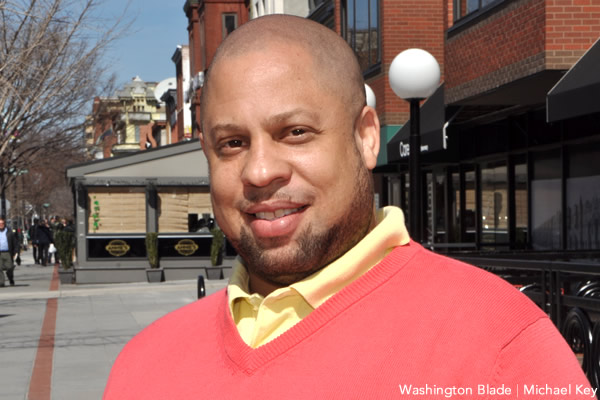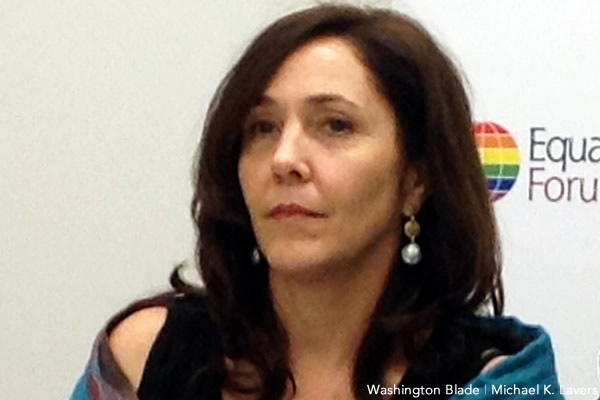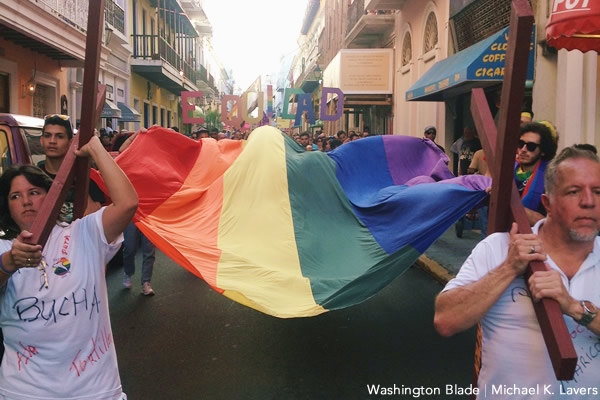Travel industry representatives meet with Caribbean LGBT advocates
Dane Lewis, executive director of the Jamaica Forum for Lesbians, All-Sexuals and Gays, is among the Caribbean LGBT advocates who met with travel industry representatives in Miami on Sept. 19. (Washington Blade photo by Michael Key)
Travel industry representatives last week met with a group of Caribbean LGBT rights activists to discuss ways they can support advocacy efforts in the region.
Out Think Partners organized the Sept. 19 meeting that took place at Celebrity Cruises’ Miami headquarters on behalf of the Kevin J. Mossier Foundation, which RSVP Vacations founder Kevin J. Mossier founded to support LGBT rights efforts in the U.S. and around the world.
Representatives from Marriott, Club Med, Cruise Planners and Silver Sea Cruises are among those who took part in the gathering. Advocates from the Bahamas, the Dominican Republic, Dominica, St. Lucia, Grenada, Trinidad and Tobago, Jamaica and Belize gave presentations about the state of LGBT rights in their respective countries.
Officials from the State Department also took part.
“We discussed what is the real situation for LGBT persons who live on these islands and who live in the Caribbean,” Maria Fontenelle of United and Strong, a St. Lucian LGBT advocacy group, told the Washington Blade. “That is the main thing the Caribbean participants brought to the table.”
Dane Lewis, executive director of the Jamaica Forum for Lesbians, All-Sexuals and Gays, said he and others who took part in the meeting discussed ways the travel industry could support Caribbean LGBT advocacy efforts. These include the possibility of companies hosting events at their resorts and on their cruise ships and providing their guests with opportunities to meet local LGBT advocates while they are visiting a particular country.
“The meeting with travel leaders was an excellent idea,” Lewis told the Blade. “[It was] a well-needed first conversation about ways to collaborate.”
Sylvester Jno. Baptiste of the Caribbean HIV/AIDS Partnership of Dominica agreed.
“It was a very interesting meeting, something that was needed in terms of getting the view from the Caribbean,” he said. “It also gave me hope of more can be done.”
Out Think Partners President Steve Roth also described the meeting as positive.
“[We] certainly [wanted] to take the focus of what the travel industry could do to help advance equality for LGBT people,” he told the Blade on Tuesday.
’Things are very difficult in the Caribbean’
Consensual same-sex sexual acts remain criminalized in Dominica, Jamaica, Belize, St. Kitts and Nevis, Antigua and Barbuda, St. Lucia, Grenada, St. Vincent and the Grenadines and Trinidad and Tobago.
Javed Jaghai, a Jamaican gay rights advocate, last month withdrew his lawsuit against his country’s anti-sodomy law because of concerns over his personal safety and that of his family. The United Belize Advocacy Movement, a Belizean HIV/AIDS advocacy group, in 2010 challenged the Central American country’s law that criminalizes homosexuality.
Anti-LGBT violence remains pervasive throughout the region.
A report from the Jamaica Forum for Lesbians, All-Sexuals and Gays notes at least 30 gay men were murdered on the island between 1997 and 2004.
A man stabbed Brian Williamson, who co-founded the Jamaican LGBT advocacy group, to death inside his home in Kingston, the country’s capital, in 2004. A group of partygoers outside Montego Bay in July 2013 killed Dwayne Jones after they discovered the teenager was cross-dressing.
The murder of gay Puerto Rican teenager Jorge Steven López Mercado in late 2009 underscored what local advocates argued was endemic anti-LGBT violence and discrimination in the U.S. commonwealth. A man in Dominica was stabbed to death in 2010 because he was reportedly “watching” his killer in a public place.
Several people in the Haitian capital of Port-au-Prince in August 2013 were reportedly injured after a mob attacked a British man and his partner as they celebrated their engagement. Bahamian LGBT rights advocates earlier this month cancelled a Pride event on the island of Grand Bahama because of vocal opposition from local religious leaders.
Lawyers from the Alliance Defending Freedom and the Catholic Family and Human Rights Institute have advised the group defending Belize’s anti-sodomy law, according to a 2013 report from the Southern Poverty Law Center. Anti-LGBT evangelicals from the U.S. have also traveled to Jamaica to support those who oppose efforts to decriminalize homosexuality on the island.
“Things are very difficult in the Caribbean,” Suzanne Gomez-Ferdinandus, a member of a Trinidadian LGBT advocacy group who attended the Miami meeting, told the Blade. “It’s very hard to get our governments to open the doors to change.”
Ron Gulaskey of Celebrity Cruises told the Blade during a telephone interview from Miami on Monday that he was “horrified” to hear the advocates’ stories of discrimination and violence in their respective countries.
“I had no idea,” said Gulaskey, who is straight. “In the U.S., especially living in South Florida, I was under the impression there wasn’t these issues. I was just horrified.”
LGBT issues gain some traction in region
The Cayman Islands in 1998 refused to allow a cruise ship with 900 gay passengers to dock. Religious officials in the British territory in 2010 pressured local authorities to prohibit an Atlantis Events vessel from visiting the islands.
Authorities in Dominica in 2012 arrested two men who were reportedly seen having sex on a Celebrity Cruises ship as it docked in Roseau, the country’s capital.
Religious groups in the Bahamas, Jamaica and Grenada have also spoken out against gay and lesbian cruise ships that seek to visit their respective countries.
Caribbean advocates with whom the Blade has recently spoken were quick to note LGBT rights have gained some traction in recent years in spite of these controversial incidents
Same-sex couples can legally marry in Martinique, Guadeloupe, St. Martin and St. Barthelemy and the Caribbean Netherlands that include Bonaire, Saba and St. Eustatius.
Mariela Castro has been credited with spearheading the Cuban government’s efforts to reduce HIV/AIDS rates in the Communist country. (Washington Blade photo by Michael K. Lavers)
Mariela Castro, daughter of Cuban President Raúl Castro, has spoken out in support of marriage rights for gays and lesbians. Judi Buckley, a senator in the U.S. Virgin Islands, in May introduced a bill that would allow gays and lesbians to tie the knot in the American territory.
Two women earlier this year filed a federal lawsuit seeking recognition of their Massachusetts marriage in Puerto Rico. Four other same-sex couples; Lambda Legal and Puerto Rico Para Tod@s, a Puerto Rican LGBT advocacy group, joined the case in June.
Maite Oronoz Rodríguez in July became the first openly LGBT judge to sit on the Puerto Rico Supreme Court. Gay U.S. Ambassador to the Dominican Republic James “Wally” Brewster has been in his post since late last year in spite of vocal opposition from the country’s religious leaders.
Cuban lawmakers late last year approved a proposal that would amend the country’s labor law to ban anti-gay employment discrimination. Puerto Rico Gov. Alejandro García Padilla in May 2013 signed into law two bills that banned anti-LGBT discrimination and added gender identity and expression to the U.S. commonwealth’s domestic violence laws.
Two Trinidadian government officials were among those who attended an April reception with Dennis and Judy Shepard that took place in the country’s capital of Port of Spain. Jowelle Taylor de Souza, a trans Trinidadian woman, last month announced she will run in the country’s parliamentary elections.
Belizean First Lady Kim Simplis-Barrow last year spoke out against anti-gay discrimination and violence in a video that commemorated the annual International Day Against Homophobia and Transphobia.
Jamaican Prime Minister Portia Simpson-Miller pledged during her 2011 election campaign that her government would review her country’s anti-sodomy law. She also said she would call for a so-called conscience vote that would allow parliamentarians to consult with their constituents on the issue.
Such a vote has yet to take place.
’Engaged tourism’ creates LGBT visibility in Caribbean
The majority of Caribbean economies remain highly dependent upon tourism. The International Gay and Lesbian Travel Association estimates LGBT tourists have a global spending power of more than $140 billion.
The Curacao Tourism Board in 2007 launched the Caribbean’s first LGBT-specific tourism marketing campaign.
Advocates with whom the Blade spoke said boycotts of Caribbean countries over their LGBT rights records would actually further antagonize those who oppose them and their efforts. They also concluded those who work within the tourism industry would suffer.
“Their reaction could easily be one that further isolates LGBT folks, saying well now I’m losing my job or I’m missing out on my salary because of you and because the U.S. thinks that you’re so important,” Malaika Brooks-Smith-Lowe of Groundation Grenada, a Grenadian human rights organization, told the Blade. “I’m not sure that that is the most useful approach.”
“The one thing our region has in abundance is natural resources,” added Fontenelle. “It’s something that other people in other regions may not have access to. We want to be able to give them access to it.”
Brooks-Smith-Lowe stressed the importance of what she described as “more meaningful” and “more engaged tourism,” referring to a lesbian couple from Aruba and the Netherlands who recently conducted writing and visual arts workshops in Grenada while visiting the island.
“That was so powerful for people,” said Brooks-Smith-Lowe. “It creates visibility in a way that allows us to see that we really are missing out on whole segments of our population and the world if we just totally dismiss queer individuals.”
Those who organized the meeting said they hope to hold future gatherings on how the travel industry can further support LGBT advocacy efforts in the Caribbean.
“The idea was to really kickstart a dialogue and to start building relationships between these two worlds,” said Roth. “And from there to create a platform to start finding ways to potentially collaborate.”
Marchers carry a Pride flag and crosses with the word “discrimination” during an LGBT rights march in San Juan, Puerto Rico, on May 17, 2013. (Washington Blade photo by Michael K. Lavers)



Leave a Reply